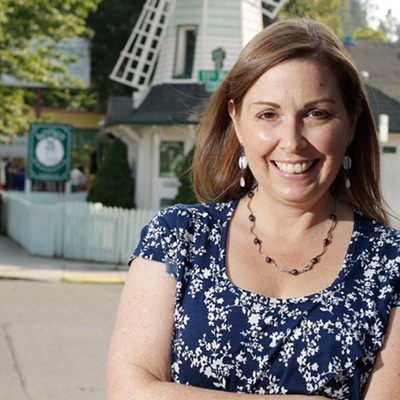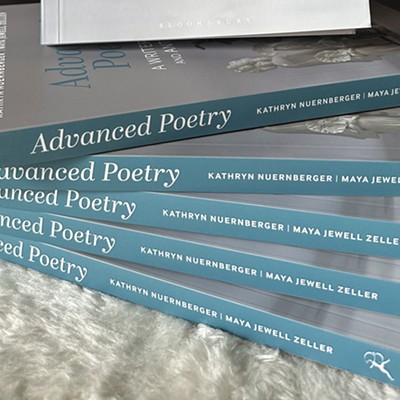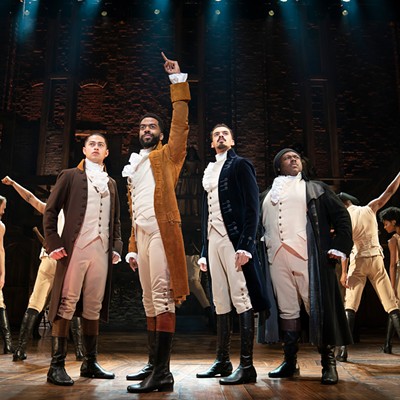
There's a science to the way Dominik Sretenovic approaches poetry.
First, Sretenovic chooses a poem he will read out loud in front of judges and his peers. He picks one that makes him feel something, because he knows that will make the audience feel it, too. He reads it over again and again until it becomes part of him, identifying key words he should emphasize for emotional impact. Then, he practices.
"You can say a poem and it can be very dull," Sretenovic says. "But when you find in each poem where to put your emotion in, more people will like it."
Sretenovic, a sophomore, used that preparation to win the Poetry Out Loud competition at Mead High School this year. Poetry Out Loud is a national initiative from the National Endowment for the Arts (NEA) that lets kids compete as they perform poetry.
Yet Before Poetry Out Loud, Sretenovic never had much interest in poetry. It was too slow. Too boring. He didn't understand what he was reading. Poetry Out Loud, required in many Mead classes, has students choose from nearly 1,000 poems to recite. That, Sretenovic says, unlocked his love of the art form.
"I felt like I got to connect more to the poems," he says. "I had to read a few and see how they felt to me ... that's how, I believe, discovering poems touches people when they find the right one."
The competition has taken off at Mead, which had a student named Langston Ward win the national Poetry Out Loud finals in 2013. Today, more than 1,000 Mead students participate in Poetry Out Loud, outpacing other schools in the region. And the participation has piqued the interest of national researchers who have selected Mead for a study, funded partially by the NEA, measuring the potential benefits that Poetry Out Loud can have on students. It's a question that's yet to be answered by researchers: As education remains fixated on science, technology, engineering and math (STEM), what value does poetry have?
Dori Whitford, an English teacher at Mead High School, admits she used to struggle teaching poetry. But she believes it's important, even as she's seen dwindling enthusiasm for poetry in the world of education during her more than 35 years of teaching. When she heard about Poetry Out Loud more than a decade ago, she wondered if it would help get students engaged with poetry.
It did. Since then, word has spread throughout the school, to the point that nearly every English teacher requires students to recite a poem out loud.
"Just about everybody here is on board," Whitford says.
Yet fostering an appreciation for poetry isn't the only reason to teach it, says Jennifer Benka, the executive director of the Academy of American Poets, which promotes poets and poetry across the country, including in schools. There are plenty of practical reasons to present poetry in the classroom as well. It helps students strengthen literacy and communication skills, and more.
"When reading a poem, the objective is not to solve it in order to arrive at one correct answer, but to have an experience with language that prompts feeling and gives insight into another person's life or a specific event that can promote greater understanding," Benka tells the Inlander.
Jonathan Johnson, an English professor at Eastern Washington University, tells his students that poetry can help them live a fuller life. Johnson has read thousands of poems about winter and snow, for instance, so when it snows outside, he can recall any number of those.
"Arts and poetry are the ways in which we're more fully in our moments as we live them," Johnson says.
Yet those ideas can go over the head of grade school students. At a young age, children are typically taught things like basic rhyming, or what a stanza is. It doesn't always resonate.
"Growing up in elementary school, there were all these rules to it, all these certain types of poems, and I didn't really like that," says Zane Mularski, a senior at Mead.
Even Katie Laurier, another Mead student whose dad is a poet, never took much of an interest in poetry in school. Instead, she discovered it on her own. And when she did Poetry Out Loud, she loved it.
"Poetry is very much supposed to be heard," Laurier says.
Indeed, Johnson agrees that reading poems out loud can help engage students with poetry. It's a mistake to think of a poem as something that exists on a page, he says: Kids love language, but when it's used as a tool, it loses its luster. Perhaps, that's why Poetry Out Loud works for some students: They can discover poems on their own and they're forced to speak it out loud.
That can translate to other subjects. Sretenovic, the sophomore, says it has improved his skill in analyzing texts, for instance.
Melissa Huggins, executive director for Spokane Arts, which coordinates Poetry Out Loud locally, says the competition can benefit students in various ways, including practical skills and helping them understand something new about themselves.
"The act of researching and memorizing and being trained to deeply interrogate something is incredibly valuable for students to experience," Huggins says.
But is there quantifiable evidence to back any of these benefits up? Not really, says Melissa Mack, one of the researchers conducting the national study of Poetry Out Loud.
"There's very limited research about arts education," Mack says. "And there's almost nothing about poetry."
Mead is one of 10 schools in the country selected for the study on how participating in Poetry Out Loud might have an effect on student outcomes. Five of them happen to be in Washington. The NEA wanted to choose schools where Poetry Out Loud was considered "optimally implemented," and Mead — among other considerations — met that criteria.
Researchers will visit Mead this month, where they will conduct interviews, focus groups, surveys and pull data from the district, trying to measure, in any way they can, how it can impact students. While Mack says she has no idea what will come from the study, she says they have some assumptions: "That the arts are not icing on a cake, that they're critical to the development of human beings," she says.
Benka, from the Academy of American Poets, says she's generally supportive of research into poetry in school. It helps encourage school officials to emphasize poetry in class, Benka says.
"The more ways in which we have to understand and validate the importance of poetry in young people's lives, the better," she says.
There are other ways to convince classrooms to emphasize poetry. Poets can, and often do, visit classrooms and extol the power of poetry. Often, students discover it when they hear a moving poem.
But maybe that isn't enough.
"Just like people learn differently, people are moved differently, too," Benka says. "Some people need positive impact translated into something quantifiable before they might take action." ♦























